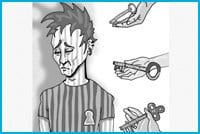The recent suicide of 13-year-old Shaquille Wisdom, a gay boy in Ajax who was being bullied, has emphasized how important it is for queer youth to be aware of the resources available to them.
With the holiday season upon us it’s also important for adults who may be feeling depressed to know who they can contact for support and help.
The Lesbian Gay Bi Trans Youth Line receives about 300 to 500 calls a month from kids in Ontario and December tends to be a particularly busy month.
“We definitely get a lot of calls around the holiday,” says Jennifer Fodden, the Youth Line’s executive director. “Many youths who are not connected to their families can find it a hard time to get through. Suicidal ideation is a very common theme.”
Sara Shwadchuck, a counsellor with Kids Help Phone — a national counselling service that received 1.5 million calls last year from 3,000 communities across Canada — says queer kids are often emotionally battered into depression.
“With LGBT youth the difficulty is self-acceptance or they’re dealing with so much homophobia,” she says. “We ask them questions that make them think about what the good is that’s happening in their lives.”
Fodden says that the farther away from downtown Toronto — which boasts such well-established organizations as Supporting Our Youth and Central Toronto Youth Services — the fewer the resources available to queer youth.
“Sometimes the Youth Line’s toll-free number and the internet are the only resources available,” she says.
But Fodden says that even remote communities usually have some queer-specific resources available.
“One way to find the pulse of what’s happening in a community is through PFLAG [Parents and Friends of Lesbians and Gays],” she says. “They may know about the queer-positive youth group that’s happening at a drop-in centre. Sometimes a local AIDS service organization also runs youth groups or outreach programs.”
Fodden says the Youth Line is often able to refer queer youth to groups on university or college campuses.
In the case of Durham region, which includes Ajax, the AIDS Committee of Durham Region (ACDR) does some youth outreach.
“There aren’t a lot of supports, a lot of programs in Durham,” says Tiff Idems, the ACDR’s health promotions coordinator. “We do find ourselves doing a lot of support, whether it be youth calling directly or parents calling for children.”
The ACDR also has a pamphlet aimed at queer youth in Durham which is available on their website. The pamphlet includes sections on coming out and dealing with homophobia.
Idems also points to youth workers at the Ajax Youth Centre as a source of help.
Amy Nagel, a health promoter at the Youth Centre, says a queer youth drop-in group will be starting on Tue, Jan 22 for those aged 13 to 19. She says queer youth searching for help can contact the centre for confidential medical care and counselling.
Scarborough’s Shoniker Clinic, a mental health clinic for adolescents, also offers a queer youth group called Prism for those in Durham and Pickering. Denyse Brushett, who runs the group, says queer youth in those areas who are desperate should contact the clinic.
“If they’re really struggling or anxious, this would be appropriate,” she says. “They would need a doctor’s referral but if a youth were to call me I would help them through that process.”
Queer youth services also sometimes find themselves dealing with desperate adults who have nowhere else to turn. Fodden recommends they contact the Distress Line.
Karen Letofsky, the executive director of the Distress Centres of Toronto, which operates the local Distress Line, says they get a lot of queers among the 120,000 callers they hear from annually.
“We’re very gay-positive,” she says. “A number of our counsellors are gay themselves.”
Letofsky says the line deals with suicidal callers but many queers just want a supportive voice.
“The support comes with the phone call,” she says. “They can call as often as they want. Sometimes they just want emotional release in the moment, they feel the need for human connection.”


 Why you can trust Xtra
Why you can trust Xtra


